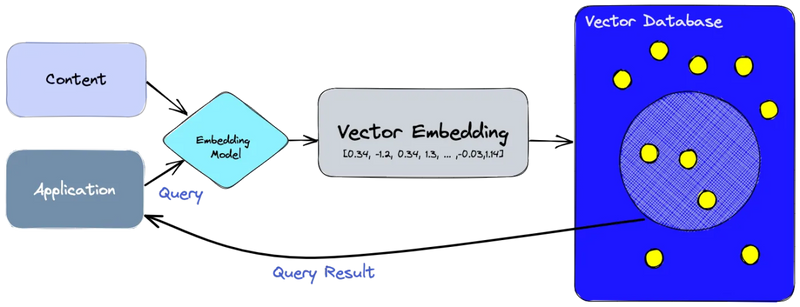Modern search systems are the backbone of many applications, from e-commerce and social media to healthcare and finance. However, as the volume and complexity of data continue to grow, traditional search systems are struggling to keep up. Scalability issues, including slow query performance and inefficient data storage, are becoming major bottlenecks.
Can vector databases provide a solution to these challenges?
What is a Vector Database?
Vector databases are a new breed of databases designed to efficiently store and query large amounts of high-dimensional vector data. Unlike traditional relational databases, which store data as rows and columns, vector databases store data as vectors, allowing for fast and efficient similarity searches and clustering.
This makes them particularly well-suited for applications such as image and video search, natural language processing, and recommendation systems. By leveraging advanced indexing techniques and distributed computing, vector databases can handle massive datasets and support complex queries, making them an attractive solution for modern search systems.
Limitations of Traditional Search Systems
Traditional search systems, such as those based on keyword indexing and inverted indexing, are struggling to keep up with the demands of modern applications. These systems are designed to handle simple keyword searches, but they are not equipped to handle the complex queries and filtering required by modern applications. As a result, they are often slow, inefficient, and prone to errors.
Furthermore, traditional search systems are not designed to handle high-dimensional data, such as images, videos, and audio files, which are becoming increasingly common in modern applications. This has led to a proliferation of specialized search systems, each designed to handle a specific type of data, but this approach is fragmented and inefficient.
How do Vector Databases Cover those Limitations?
Vector databases offer a number of benefits for search systems, including improved performance, scalability, and flexibility. By storing data as vectors, vector databases can efficiently support similarity searches, clustering, and other advanced query types. This makes them particularly well-suited for applications such as image and video search, natural language processing, and recommendation systems.
Additionally, vector databases can handle high-dimensional data and support complex queries, making them a more comprehensive solution than traditional search systems. Furthermore, vector databases can be easily integrated with machine learning models and workflows, allowing for more accurate and personalized search results.
Scalability Issues in Modern Search Systems
The scalability challenges faced by modern search systems are significant. As the volume and complexity of data continue to grow, search systems must be able to handle massive datasets, support complex queries, and maintain performance and latency. However, traditional search systems are not designed to handle these challenges, and are often overwhelmed by the demands of modern applications.
Vector databases, on the other hand, are designed to handle massive datasets and support complex queries, making them a more scalable solution. Additionally, vector databases can be easily distributed and parallelized, allowing them to take advantage of modern computing architectures and handle large volumes of data. By leveraging these capabilities, vector databases can provide a scalable solution for modern search systems, and help to unlock the full potential of modern applications.
How can Vector Databases cover Scalability Issues?
Scalability is a critical issue for modern search systems, as they must handle massive datasets, support complex queries, and maintain performance and latency. Traditional search systems often struggle to meet these demands, leading to slow query performance, inefficient data storage, and poor user experiences. Vector databases, however, are designed to handle the scalability challenges of modern search systems, offering several solutions to these problems.
One key advantage of vector databases is their ability to efficiently store and query high-dimensional data. Traditional search systems are often optimized for low-dimensional data, such as text and keywords, and are not equipped to handle high-dimensional data. Vector databases, by contrast, can efficiently store and query massive datasets, making them well-suited for applications like image and video search, natural language processing, and recommendation systems.
Vector databases also support distributed computing and parallel processing, allowing them to take advantage of modern computing architectures and handle large volumes of data. This makes them particularly well-suited for applications that require fast query performance and low latency, such as real-time search and recommendation systems.
Overall, vector databases offer a range of solutions to the scalability issues faced by modern search systems. By efficiently storing and querying high-dimensional data, supporting distributed computing and parallel processing, and offering other scalability benefits, vector databases can help unlock the full potential of modern applications and provide fast, efficient, and personalized search experiences for users.
Conclusion
In conclusion, vector databases are revolutionizing the search landscape by efficiently storing and querying high-dimensional data. They offer a scalable solution for modern search systems, enabling fast query performance, low latency, and personalized results.
With the rise of AI-powered applications, vector databases are becoming increasingly important. Platforms like Vectorize.io are leading the charge, providing a scalable and efficient vector database solution for businesses to build fast and accurate search functionality. By leveraging vector databases, developers can unlock new possibilities in search and recommendation systems.



Top comments (1)
Cloud setups definitely make life easier—until you hit the point where managing customer data, support, and CRM tools starts eating your time. I ran into that wall a while back and started looking into crm outsourcing companies . Ended up trying and it was a game changer. Offloading that part let me focus more on dev and less on handling tickets and follow-ups. Sometimes the best optimization isn’t just in code—it’s in what you stop doing yourself.